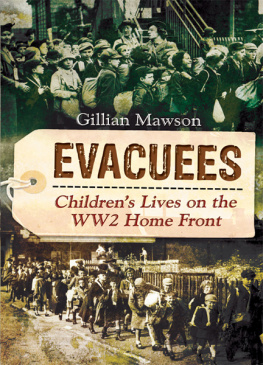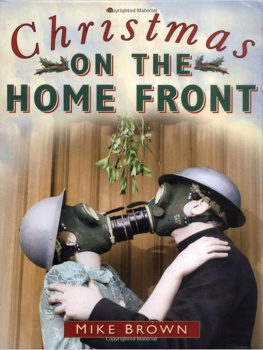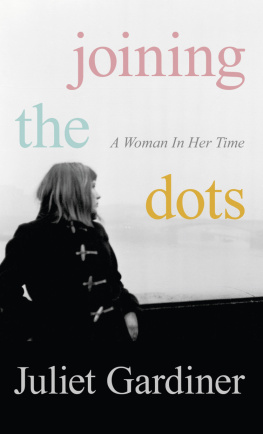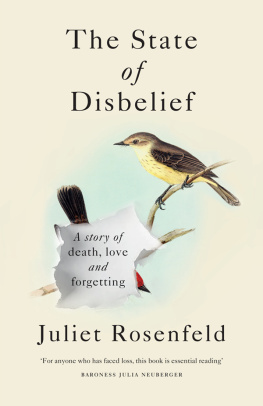Copyright 2004 Juliet Gardiner
The right of Juliet Gardiner to be identified as the Author of the Work has been asserted by her in accordance with the Copyright, Designs and Patents Act 1988.
Apart from any use permitted under UK copyright law, this publication may only be reproduced, stored, or transmitted, in any form, or by any means, with prior permission in writing of the publishers or, in the case of reprographic production, in accordance with the terms of licences issued by the Copyright Licensing Agency.
First published as an Ebook by Headline Publishing Group in 2016
Cataloguing in Publication Data is available from the British Library
eISBN: 9781472241498
HEADLINE PUBLISHING GROUP
An Hachette UK Company
Carmelite House
50 Victoria Embankment
London EC4Y 0DZ
www.headline.co.uk
www.hachette.co.uk
Juliet Gardiners critically acclaimed book - the first in a generation to tell the peoples story of the Second World War - offers a compelling and comprehensive account of the pervasiveness of war on the Home Front. The book has been commended for its inclusion of many under-described aspects of the Home Front, and alongside familiar stories of food shortages, evacuation and the arrival of the GIs, are stories of Conscientious Objectors, persecuted Italians living in Britain and Lumber Jills working in the New Forest. Drawing on a multitude of sources, many previously unpublished, she tells the story of those six gruelling years in voices from the Orkney Islands to Cornwall, from the Houses of Parliament to the Nottinghamshire mines.
Juliet Gardiner is a historian with wide academic and commercial credentials. She spent five years as editor of History Today magazine, and has been Academic Director at Weidenfeld & Nicolson and Head of Publishing Studies at Oxford Brookes University. She has contributed widely to the UKs national press and her television experience includes being a member of the on-screen member of the war cabinet for The 1940s House, for which she was also the historical consultant. She is the author of ten books.
In memory of Charles and Dorothy Wells,
but for Pearl and Mercy Gardiner Phipps.
has
several possible endings.
Siri Hustvedt, What I Loved
T HE S ECOND W ORLD War was a war that most British people had fervently wished to avoid, coming as it did little more than two decades after the end of the war to end war; the war that would settle nations once and for all; the war to which memorials clutter up the whole country the war that was to teach the folly of war, wrote Vivienne Hall, a thirty-one-year-old shorthand typist living in London, as war threatened again. It was characterised as a peoples war at the time, and by historians ever since. A peoples war writes a contract between the leaders and the led, constituting a demand for just rewards for those who fought on the Home Front as on the battlefield: the phrase was appropriated by government to urge greater effort and suggest shared sacrifice. Yet at its simplest a peoples war describes the fact that in modern warfare almost the entire civilian population is mobilised for the war effort, and in the years between 1939 and 1945 would have the experience of death, destruction and deprivation on the Home Front as those in uniform would in other theatres of war.
In 1940 the writer Lionel Birch wrote an article for the magazine Lilliput about soldiers dreaming of how they would spend their leave. But when we did at last get our forty-eight[hour passes]... we realised the revolutionary truth: [in this war] there is no such thing as leave... Today war follows you around, even when you were on leave. On the platform of the London terminus it is waiting there to meet you; and as you round the bend of the village main street, you come face to face with it again. You encounter it in the eyes of your civilian friends. The burr-burr of the telephone in the empty room of the girl who has gone away convinces you. There is no such thing as leave... from the demands of prosecuting the war, no relief from its imperatives, restrictions and shortages, no let-up from the fear of death or injury by enemy action.
The pervasiveness of the war is the theme of Wartime. But while regulations about such necessities as blackout, gas masks and rationing were uniform, and duties in the military, war production or Civil Defence compelled a large swathe of the adult population, the actual experience of war varied in ways that were multi-layered and sometimes contradictory.
War tested on the wheel many of the easy assumptions of peace: what would it mean for the Irish, the Scots, the Welsh to play an active part in the war effort of a country invariably known as England? How would those who refused to fight, or those who had come to take refuge from countries that were now Britains enemies, or those who were native-born fascists in a war against fascism, be treated? How would women be integrated into the war effort and what would be the effect of their conscription for the first time in the history of the so-called civilised world? And what of the Communist Party with its fractured allegiances in an imperialist struggle against Nazi Germany at a time when the Soviet Union was aligned with the enemy? What did going to war mean for soldiers, nearly half of whom would never leave Britains shores? How could writers, painters, musicians and actors find a role for their art in war-torn Britain?
Britain was many places between 1939 and 1945: it was towns and cities ravaged by bombs; it was coastal regions depopulated and barricaded against invasion or cleared for military training; it was rural areas that may have escaped enemy action, yet were disrupted by large-scale evacuation.
For the British people war brought paradox: lives were transformed through unprecedented mobility, compulsion, separation, deprivation and danger. Yet war also brought new opportunities and raised expectations, boosted confidence and increased scepticism of authority. And war overwrote social, regional, political and generational divisions but without obliterating them. Many would persist throughout the six years of conflict, colouring the experience of war and shading into the peace.
During the Second World War, the writer Elizabeth Bowen found herself unable to write a novel; it was impossible to find the narrative. She turned instead to penning short stories. Sixty years after the end of the war, if the big picture of a nation united in courageously facing a common enemy holds steady as it surely does so too do the short stories, the details of peoples varied experiences of war that complicate and nuance that picture. Wartime is an attempt to keep in frame both the stories of peoples lives and the dramatic circumstances in which they were played out.
O N 30 S EPTEMBER 1938 the British Prime Minister, Neville Chamberlain, returned from a meeting with the German Chancellor, Adolf Hitler, in Munich. He was clutching a piece of paper that he waved as evidence of a peaceful resolution to the crisis that had threatened when the Fhrer prepared to invade Czechoslovakia. Peace for our time the Prime Minister proclaimed. He was mobbed by grateful citizens cheering and singing. As far as the socialite MP Sir Henry Chips Channon was concerned, the whole world rejoices and only a few malcontents jeer. Chamberlain received more than 40,000 letters the impression given and stated by the Premier was that these were all letters of tribute and praise and it was even suggested that Chamberlains trademark furled umbrella should be broken up and its fragments sold like holy relics.
Munich would be the final desperate throw of Chamberlains attempt to avoid war by appeasing Hitlers demands for territorial expansion in Eastern Europe. At the end of the First World War, the Treaty of Versailles had imposed punitive terms on the loser: Germany was stripped both of territory and population, it lost its overseas colonies and assets, was almost completely disarmed and was saddled with a massive war indemnity. The final humiliation had come with the Allies insistence that Germany must formally admit to her guilt and pay reparations at a sum to be fixed by the victors in the event, 132 billion gold marks which would have been a charge on the German economy until 1988. These harsh terms aroused intense resentment, and Germany blamed the vindictiveness of the Allies for the countrys catastrophic economic and political situation: it was this resentment that Hitler would be able to exploit in the furtherance of his expansionist aims.
Next page






